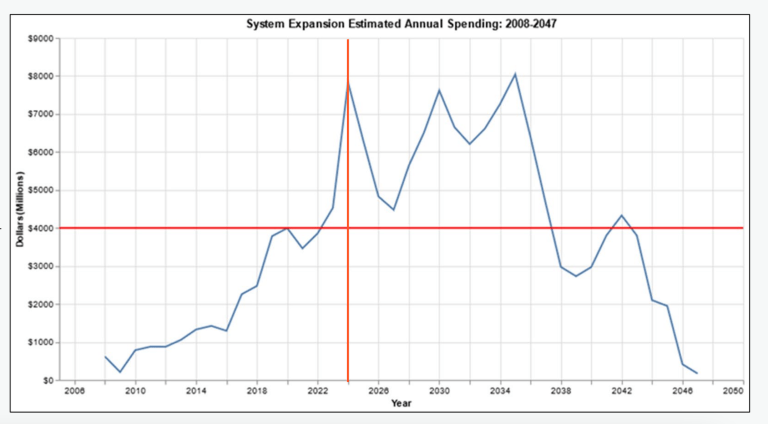Expert Panel “Disappointed” In Sound Transit’s Lack of Progress on Recommendations to Avoid Overruns, Delay
An advisory group expressed alarm at the light rail agency's seeming lack of urgency under current CEO Julie Timm.

By Erica C. Barnett
A panel of outside experts established last year to help Sound Transit reduce delays to its burgeoning portfolio of megaprojects expressed disappointment last week with the agency’s progress on six recommendations it made in February, noting that many are just now getting underway after many months of delay. With the agency entering the most intense period of capital expansion in its history, members of the Technical Advisory Group (TAG) told Sound Transit’s executive committee on Wednesday, the agency needs to act aggressively to avoid major overruns and delays.
“We’re trying to up your game in order to get the dollar go a lot further. I want to make sure you understand the value of that,” TAG member Grace Crunican told the board committee. “That’s why we’re nervous about the fact that you’re not up and running. We came to you saying, ‘Hey, let’s go,’ and it’s a year later, and, ‘hey, we haven’t gone.’”
The TAG’s recommendations included restoring lost trust between the Sound Transit board and top agency staff, including CEO Julie Timm; empowering staff to take action, such as signing off on contract changes, without running every decision up the management chain; and hiring an “experienced megaproject capital program executive team” to oversee the expansion of light rail to Tacoma, Lynnwood, Ballard, and West Seattle. The agency’s deputy CEO in charge of system expansion, longtime Sound Transit staffer Brooke Belman, quietly announced she was leaving earlier this year.
“I think we talked about it being a wave, and the wave was coming. The wave is not coming. It is on us right now. And that means the sense of urgency of moving forward with our recommendations is very, very real.”—Sound Transit Technical Advisory Group member Ken Johnsen
Since the recommendations came out, TAG members said, the agency has shown little urgency about putting them into practice. “It’s important to me that the top leadership embrace these changes and work on them diligently, and we’re a long way off from ‘diligently’ at this point,” Sound Transit board member Claudia Balducci told PubliCola.
“There’s been some work—we voted recently to change our contract approval thresholds so that more contracts can be completed and moved by the CEO… but when you get a recommendation that says you need to rebuild trust… that feels to me like something where there needed to be some intentional time invested by the board and the CEO and management to work on that.”
Meanwhile, Sound Transit continues to approach a point in its schedule where it will need to spend between about $5 billion and $8 billion a year to stay on track—a level of annual spending that will dwarf everything Sound Transit has built to date. “We have to change the way we do business,” Balducci said. Every day of delay, Technical Advisory Group (TAG) member Ken Johnsen told the committee, could have cascading effects on Sound Transit’s ability to deliver the projects it has promised, some of which are already running years behind schedule.
Pointing to a chart that shows the amount of money Sound Transit needs to spend on its projects each year in order to avoid major overruns and delays, Johnsen said, “if we sometimes sound overly aggressive on our sense of urgency and why these things need to be moving, it’s because of that chart. I think we talked about it being a wave, and the wave was coming. The wave is not coming. It is on us right now. And that means the sense of urgency of moving forward with our recommendations is very, very real.”
A key issue the TAG noted in its initial report was that “Sound Transit’s current culture appears to discourage decision-making”—staff either don’t feel like they can make decisions on their own, or don’t do so “for fear of making the wrong one and getting reprimanded.” These issues can produce delays that cause contractors to bid on projects where they know they’ll get paid on time and consistently; already, according to the February TAG report, top-tier contractors prefer to seek contracts with other agencies because of long delays getting invoices approved and paid.
“I feel that our recommendations were pretty clear and concise, but that’s not what we saw in these first meetings,” TAG member Connie Crawford, added. “And just the fact that it’s eight months later, nine months later, when we’re having the kickoff meetings [with staff]—that’s been a disappointment to us.”
After the discussion last week, the board went into executive session to discuss a performance review for Sound Transit CEO Julie Timm, who has been at the agency since last September. When they returned to the dais, after extending the session multiple times, the committee no longer had a quorum and had to end the meeting. However, questions about Timm’s future at the agency may be answered on Friday, when her performance evaluation is on the agenda for the board’s public meeting.




